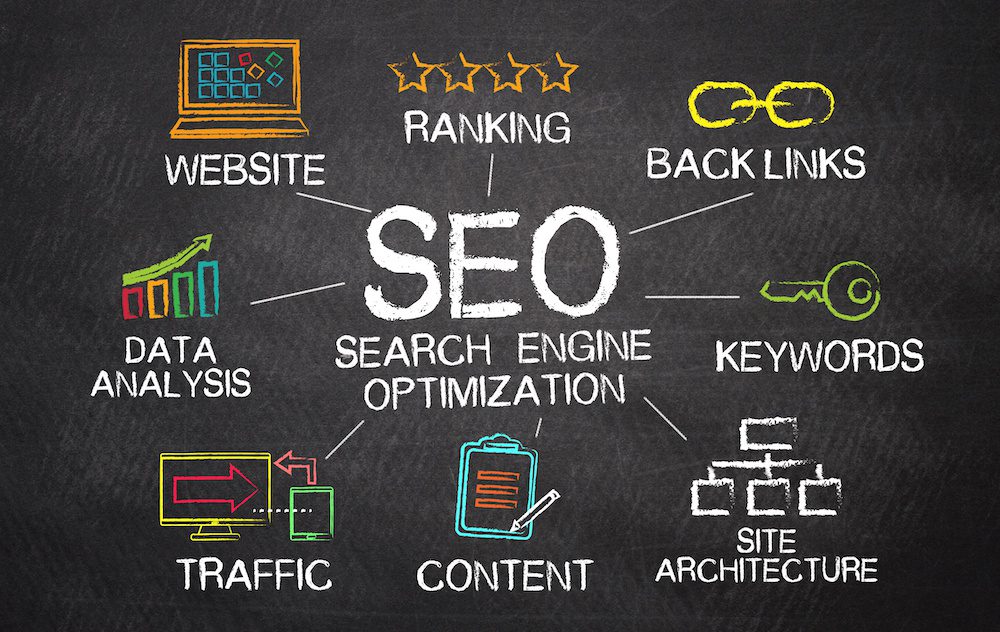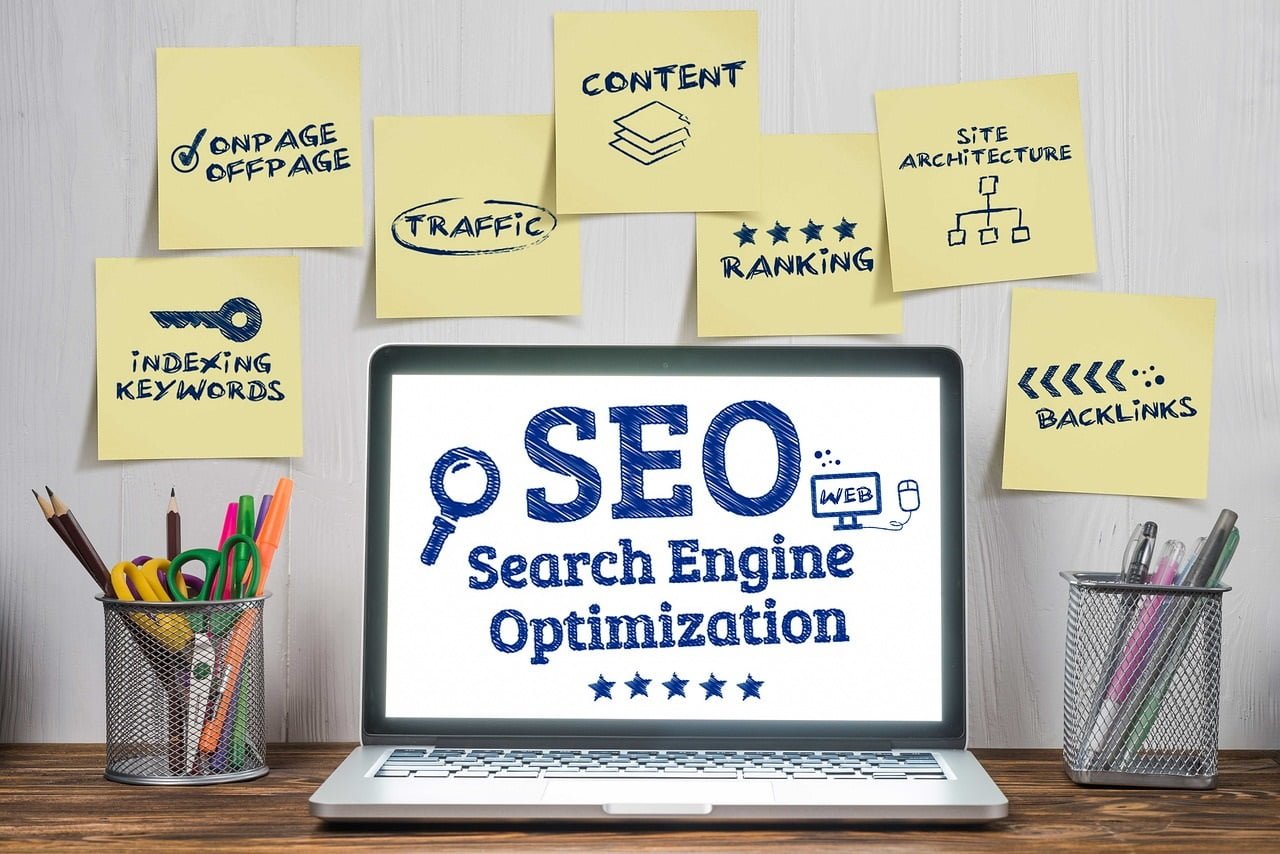Essential SEO For Businesses: Boost Your Rankings

If you’re running a business and want to stay competitive in today’s digital landscape, essential SEO techniques are a must-have. Search engine optimization (SEO) involves optimizing your website to rank higher in search engine results pages and attract more organic traffic. By implementing proven SEO best practices, you can improve the visibility of your website, increase your online presence, and attract more targeted customers to your business.
In this section, we’ll provide you with a comprehensive guide to essential SEO for businesses, covering everything from understanding the basics of search engine optimization to conducting keyword research, implementing on-page and off-page optimization techniques, and measuring the impact of your SEO campaigns. By the end of this section, you’ll have a solid understanding of how SEO works and how you can use it to boost your business’s online visibility.
Key Takeaways:
- Implementing essential SEO techniques is crucial for businesses in today’s digital marketplace.
- SEO involves optimizing your website to rank higher in search engine results pages and attract more organic traffic.
- Understanding the basics of search engine optimization, including on-page and off-page optimization and website optimization, is important for effective implementation.
- Conducting thorough keyword research can help you identify the most valuable and relevant keywords for your business.
- Measuring the effectiveness of your SEO campaigns through data analysis can help you make informed decisions for continuous improvement.
Essential SEO For Businesses
Understanding Search Engine Optimization
Search engine optimization (SEO) is a crucial aspect of digital marketing that helps your website rank higher in search engines’ results pages (SERPs). By optimizing your website’s content and structure, you can improve its visibility and relevance to search queries related to your products or services.
On-Page Optimization
On-page optimization involves optimizing the content of your website to make it more search engine friendly. This includes optimizing your content for relevant keywords, using header tags, meta descriptions, and alt tags for images, and ensuring your website’s URL structure is clean and straightforward. By focusing on on-page optimization, you can improve your website’s relevancy and user experience.
Off-Page Optimization
Off-page optimization refers to techniques that are used to improve your website’s authority and trustworthiness. This includes building high-quality backlinks from authoritative websites, engaging with your followers on social media platforms, and publishing high-quality guest posts on relevant websites. By establishing your website as an authority within your niche, you can improve its relevance and reputation in search engine results.
Website Optimization
Website optimization involves optimizing the structure and functionality of your website to improve its user experience. This includes making your website mobile-friendly, improving its loading speed, and ensuring its design is aesthetically pleasing and easy to navigate. By optimizing your website’s structure, you can enhance its functionality and user experience, leading to better engagement and increased conversions.
Understanding the key components of SEO is essential to creating effective SEO strategies for your business. By optimizing your website for on-page and off-page factors, in addition to structuring your website for the optimal user experience, you can improve your website’s visibility and attract more targeted traffic.
Conducting Keyword Research
Keyword research is a crucial starting point for any successful SEO strategy. It involves identifying the words and phrases that potential customers use to search for your products or services. By targeting the right keywords, you can improve your website’s visibility in search engine results pages and attract more relevant traffic to your site.
To conduct effective keyword research, you must first identify your target audience and understand their needs. Consider the language they use, their pain points, and the solutions that they’re looking for. Once you have a good understanding of your audience, you can use keyword research tools to find the most valuable and relevant keywords for your business.
Google Keyword Planner is a popular tool for conducting keyword research, allowing you to see search volumes and competition levels for specific keywords. Other tools to consider include SEMrush and Ahrefs, which offer comprehensive keyword research capabilities and competitive analysis features.
When selecting keywords, look for phrases with high search volume and low competition, as these are more likely to help you rank higher in search engine results pages. Try to select long-tail keywords, which are more specific and targeted, and consider using local keywords if your business has a geographic location.
Optimizing Your Website for Targeted Keywords
Once you have identified your target keywords, you must strategically integrate them throughout your website to improve its relevance and authority. On-page optimization involves placing keywords in your website’s meta descriptions, title tags, headings, and body content. However, avoid keyword stuffing, which can harm your website’s search engine rankings.
You can also use keyword research to optimize your website’s images, URLs, and internal links. Ensure that all images are appropriately named and that their file sizes are optimized for fast load times. Use descriptive and relevant URLs, and include internal links that point to other pages on your website.
| Keyword Research Tips: |
|---|
| Identify your target audience and their search behavior |
| Use keyword research tools, such as Google Keyword Planner, SEMrush, and Ahrefs |
| Target long-tail and local keywords with high search volume and low competition |
| Avoid keyword stuffing and integrate keywords strategically throughout your website |
| Optimize images, URLs, and internal links for relevant keywords |
Conducting comprehensive keyword research and strategically integrating target keywords throughout your website can significantly improve your SEO rankings. By staying up-to-date with the latest keyword research tools and techniques, you can remain competitive in your industry and attract a larger audience to your website.
Implementing On-Page Optimization
Optimizing your website’s content, meta tags, headings, and internal linking structure is crucial for effective on-page optimization. By doing so, you can enhance your website’s ranking in search engine results pages and provide a better user experience for visitors. Here are some practical tips on how to effectively optimize your web pages:
1. Conduct Keyword Research
The first step in on-page optimization is to conduct keyword research. By identifying relevant keywords and phrases, you can optimize your website content to rank for those keywords. Use tools like Google Keyword Planner or SEMrush to find high-volume, low-competition keywords that align with your business objectives.
2. Optimize Your Page Titles and Meta Descriptions
Your page titles and meta descriptions play a crucial role in on-page optimization. Ensure that your page titles accurately reflect the content of the page and contain your target keywords. Use meta descriptions to provide a brief summary of the page and include relevant keywords to attract clicks from search engine users.
3. Structure Your Content with Heading Tags
Using heading tags (H1, H2, H3, etc.) to structure your content can improve readability for visitors and help search engines understand the organization of your content. Use H1 tags for main headings and H2 tags for subheadings, and include relevant keywords when possible.
4. Use Internal Linking
Internal linking helps visitors navigate your website and also helps search engines understand the context and organization of your content. Use descriptive anchor text (text that users click on to be taken to another page) and link to relevant pages within your website.
5. Optimize Your Images
Images are important for engaging visitors and breaking up text, but they can also slow down your website if not optimized properly. Use descriptive file names and alt tags (text that appears when an image can’t be displayed) to help search engines understand your images, and compress your images to reduce file size and speed up your website.
By implementing these on-page optimization techniques, you can improve your website’s visibility to search engines and provide a better user experience for visitors.
Harnessing the Power of Off-Page Optimization
Off-page optimization plays a crucial role in improving your website’s search engine rankings. This refers to activities that are conducted outside of your website to drive traffic to your online presence, and includes link building, social media marketing, and influencer outreach.
Link building is an SEO strategy that involves acquiring high-quality backlinks from other websites to your own. These backlinks help to establish your website as an authority in your industry, and increase your online visibility. To build strong backlinks, you can reach out to relevant websites and ask for a link exchange, create high-quality content that is shareable and provides value to users, or collaborate with other businesses to create a network of mutually beneficial backlinks.
Social media marketing is another off-page optimization technique that can amplify your online presence. By building a strong social media presence and engaging with your target audience, you can drive traffic to your website and increase brand recognition. Ensure that your social media profiles are optimized with keywords and relevant content, and regularly share valuable content that resonates with your audience.
Influencer outreach involves collaborating with influencers in your industry to promote your brand and content. This helps to establish trust and credibility with your target audience, and can drive significant traffic to your website. To identify relevant influencers, use social media monitoring tools and search for key industry leaders and thought leaders who can help promote your brand.
Off-Page Optimization Techniques
| Off-Page Optimization Techniques | Description |
|---|---|
| Link Building | Acquiring high-quality backlinks from other websites to your own |
| Social Media Marketing | Building a strong social media presence and engaging with your target audience |
| Influencer Outreach | Collaborating with influencers in your industry to promote your brand and content |
By utilizing off-page optimization strategies, you can boost your website’s visibility in search engine results and drive more organic traffic to your website. Implement a comprehensive SEO strategy that includes both on-page and off-page optimization techniques to achieve long-term success and growth in the digital marketplace.
Maximizing Organic Search Traffic
Attracting organic search traffic to your website is critical for the success of your business. These visitors are actively looking for products or services related to their search queries, making them highly valuable prospects. By implementing effective SEO strategies, you can increase the amount of organic search traffic to your website and boost your rankings in search engine results pages.
Optimizing Your Content
Your website’s content is one of the most important factors in attracting organic search traffic. By creating high-quality, informative content that is optimized for relevant keywords, you can establish your website as a valuable resource for search engine users. Use keyword research to identify the most valuable keywords related to your business and incorporate them naturally into your content. Make sure your content is easy to read and understand, with headings and subheadings that break up large blocks of text.
Improving Site Speed and Responsiveness
The speed and responsiveness of your website are essential factors that influence your organic search rankings and user experience. A fast-loading website with a responsive design can significantly improve user engagement and reduce bounce rates. Use tools and techniques such as image compression, browser caching, and content delivery networks to speed up your website’s loading times. Additionally, ensure your website displays properly on all devices, from desktops to mobile phones.
Building High-Quality Backlinks
Link building is a crucial component of off-page optimization, which involves activities conducted outside of your website to impact its search engine rankings. Building high-quality backlinks from reputable and relevant websites can significantly enhance your website’s authority and visibility in search engine results pages. Focus on creating valuable content that other websites will want to link to, such as how-to guides, industry insights, or user-generated content.
Engaging with Your Target Audience
Social media marketing is a powerful tool for engaging with your target audience and driving organic search traffic to your website. By building a strong social media presence and sharing valuable, informative, and relevant content, you can attract more followers and increase your website’s reach. Encourage your followers to share your content and engage with your brand on social media platforms such as Facebook, Twitter, or LinkedIn.
Staying Updated with SEO Best Practices
As a savvy business owner, you know the value of an effective SEO strategy. But did you know that SEO best practices are constantly evolving? To stay ahead of the game, it’s crucial to keep up-to-date with the latest trends and algorithm updates.
One of the most valuable resources for staying current on SEO best practices is industry blogs. Moz, Search Engine Journal, and HubSpot are just a few of the reputable sources you can turn to for reliable insights and advice.
Another essential tool for staying updated is Google Analytics. By monitoring your website’s performance, you can identify areas for improvement and make data-driven decisions about your SEO strategy. Google Search Console is also an invaluable resource that can help you track keyword rankings, monitor backlinks, and detect crawling issues.
In today’s fast-paced digital landscape, staying stagnant is not an option. By continuously adapting your SEO strategies to meet current best practices, you can ensure long-term success and a competitive edge in your industry.
Analyzing and Measuring SEO Efforts
Implementing SEO techniques is crucial for effective website optimization. However, it is equally important to analyze and measure the impact of your efforts. This provides valuable insights into what works and what needs improvement, helping you make data-driven decisions for continuous progress.
Tracking Keyword Rankings
Monitoring keyword rankings is essential to evaluate the effectiveness of your SEO campaigns and identify areas that need improvement. You can use online tools like Google Search Console, SEMrush, or Ahrefs to track your keyword rankings and get detailed reports on which keywords are driving the most traffic to your website.
Monitoring Website Traffic
Measuring website traffic is another critical aspect of analyzing your SEO efforts. You can use tools like Google Analytics to track your website’s traffic, find out where your visitors are coming from, and identify pages that are performing well or need improvement. By monitoring your website traffic, you can make data-driven decisions about your content and optimize it for better results.
Assessing User Behavior
Examining user behavior on your website helps you understand how your visitors interact with your content and identify opportunities for optimization. You can use tools like heatmaps, clickstream analysis, and session recordings to see which pages are getting the most engagement and which areas need improvement. By assessing user behavior, you can identify site optimization opportunities that lead to higher conversions and better user engagement.
The Bottom Line
Analyzing and measuring your SEO efforts is vital for identifying opportunities for improvement and making data-driven decisions. By tracking keyword rankings, analyzing website traffic, and assessing user behavior, you can optimize your website for better results and achieve sustainable growth in the digital landscape.
Enhancing Your Local SEO Presence
As a business owner with a local presence, optimizing your website for local search is essential to attract more targeted customers and increase your visibility within your community.
The following local SEO strategies can help improve your visibility:
Claim Your Business Listings
Claiming your business listings on online directories, such as Google My Business, Yelp, and Yellow Pages, can significantly improve your local search visibility. Ensure that your business name, address, and phone number (NAP) are consistent across all platforms.
Optimize for Local Keywords
Optimizing for local keywords, such as “best restaurant in [city]” or “hair salons near me,” can help you rank higher in local search results. Incorporate these keywords naturally into your website’s content, meta tags, and headings.
Gather Positive Reviews
Positive online reviews can boost your business’s credibility and attract more customers. Encourage satisfied customers to leave a review on websites like Yelp or Google My Business. Responding promptly and professionally to negative reviews can also improve your business’s reputation.
With these local SEO strategies, you can increase your online visibility to potential customers in your area and improve your website’s rankings in local search results.
Conclusion
Now that you understand the importance of essential SEO strategies, it’s time to take action and implement them for your business. By following best practices and techniques for search engine optimization, you can boost your rankings and attract more organic search traffic to your website. Remember to conduct thorough keyword research, optimize your on-page and off-page elements, and stay up-to-date with the latest SEO trends.
It’s also essential to analyze and measure the effectiveness of your SEO efforts using tools such as Google Analytics. By continuously monitoring your website’s performance, you can make data-driven decisions for continuous improvement and stay ahead of the competition.
Don’t forget to optimize for local search if your business serves a specific geographic area. Claim your business listings, optimize for local keywords, and encourage positive reviews to enhance your local SEO visibility.
By implementing these essential SEO strategies, you can strengthen your business’s online presence, attract more organic traffic, and achieve sustainable growth and success in the digital landscape. So what are you waiting for? Start boosting your rankings and reaping the benefits of Essential SEO For Businesses today!
FAQ
What are the essential SEO strategies for businesses?
Essential SEO strategies for businesses include conducting thorough keyword research, implementing on-page and off-page optimization techniques, maximizing organic search traffic, and staying updated with SEO best practices.
How can SEO techniques boost my website’s rankings?
SEO techniques such as optimizing your website’s content, meta tags, and internal linking structure, building high-quality backlinks, and improving site speed and responsiveness can significantly improve your website’s visibility in search engine results and boost its rankings.
What is keyword research, and why is it important for SEO?
Keyword research is the process of identifying the most relevant and valuable keywords for your business. It is important for SEO as it helps you understand what your target audience is searching for and allows you to optimize your website and content to attract organic search traffic.
What is on-page optimization, and how can I implement it?
On-page optimization involves optimizing your website’s content, meta tags, headings, and internal linking structure. To implement on-page optimization, ensure your content is well-written, relevant, and keyword-rich, use appropriate meta tags, include headings, and create a logical internal linking structure.
What is off-page optimization, and how can it help my website?
Off-page optimization refers to activities conducted outside of your website that can impact its search engine rankings. It includes activities such as link building and social media marketing. Off-page optimization can help improve your website’s authority, visibility, and organic search rankings.
How can I maximize organic search traffic to my website?
To maximize organic search traffic, focus on creating high-quality and engaging content, optimizing your website for mobile devices, improving site speed and user experience, building high-quality backlinks, and promoting your website on social media and other relevant channels.
How can I stay updated with SEO best practices?
To stay updated with SEO best practices, regularly follow industry blogs and news websites, subscribe to reputable SEO newsletters, attend webinars and conferences, join online SEO communities, and continuously learn and experiment with new SEO techniques.
How can I analyze and measure the effectiveness of my SEO efforts?
There are various tools and techniques you can use to analyze and measure the effectiveness of your SEO efforts. These include tracking keyword rankings, monitoring website traffic and user behavior, conducting regular SEO audits, and setting up conversion tracking to measure the impact of your SEO campaigns.
How can I enhance my local SEO presence?
To enhance your local SEO presence, claim and optimize your business listings on Google My Business and other relevant directories, use location-specific keywords in your website content, encourage satisfied customers to leave positive online reviews, and engage with the local community through events and partnerships.





